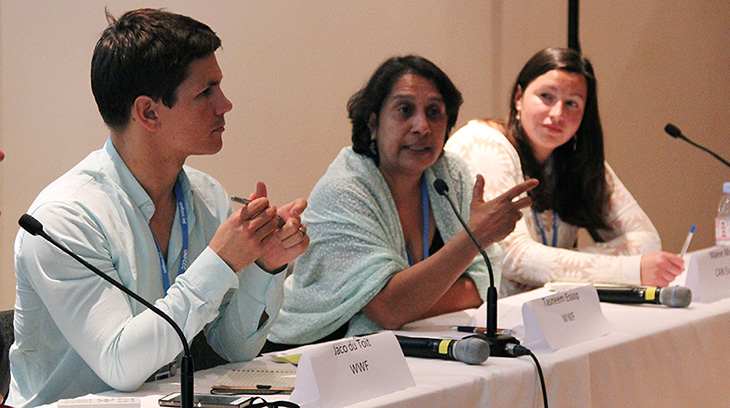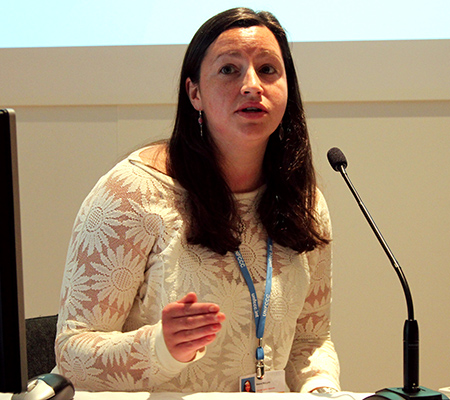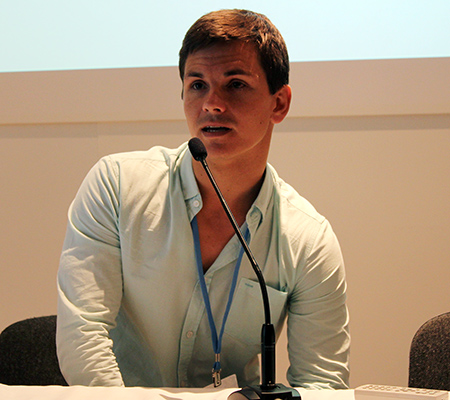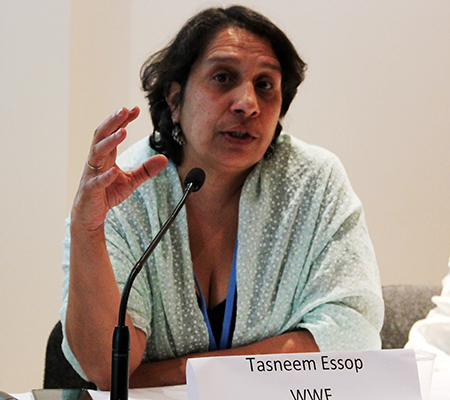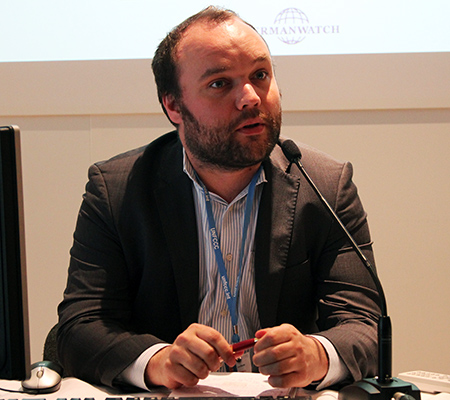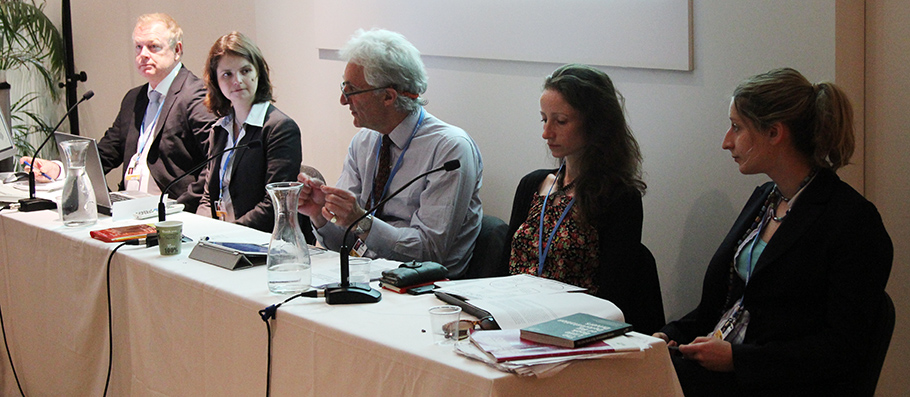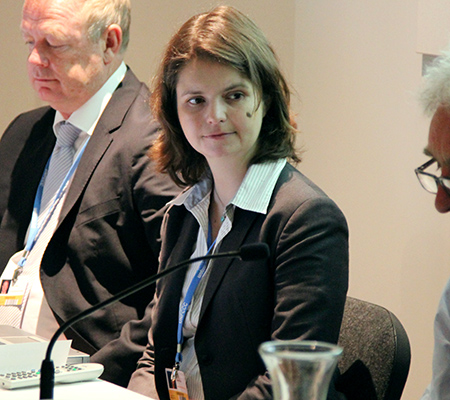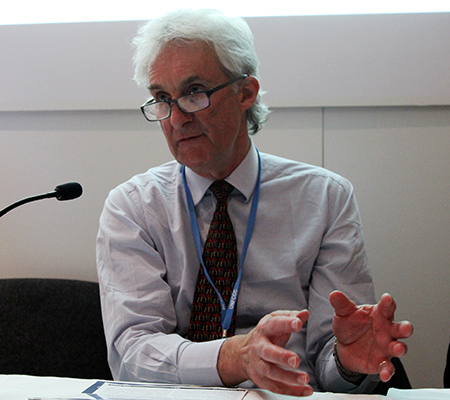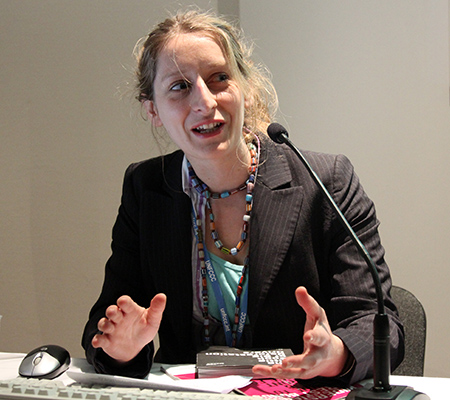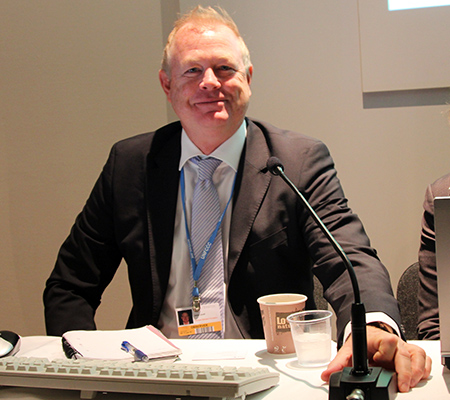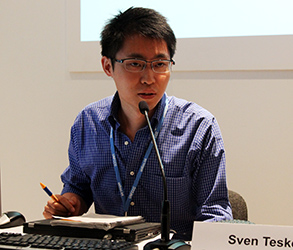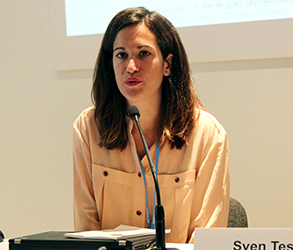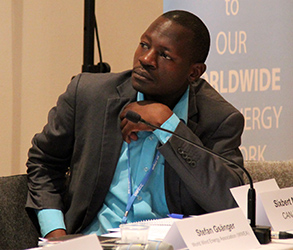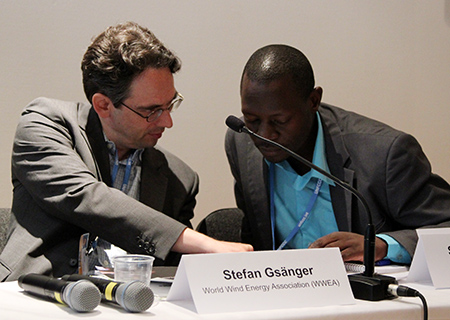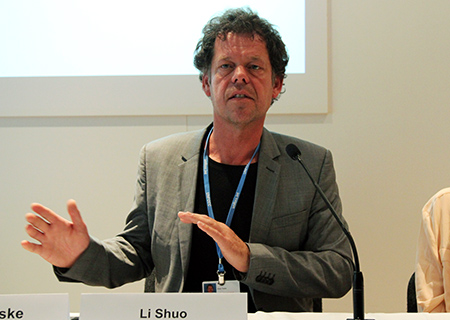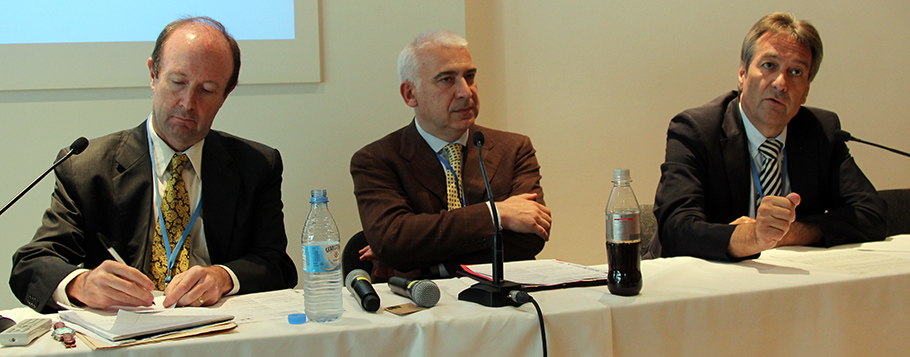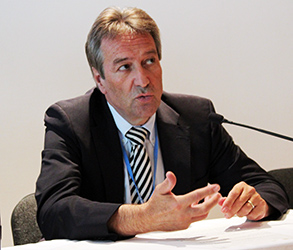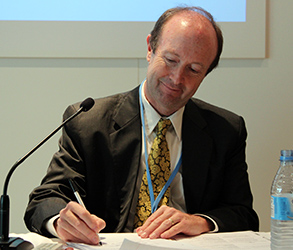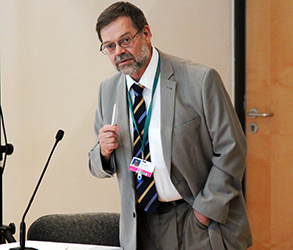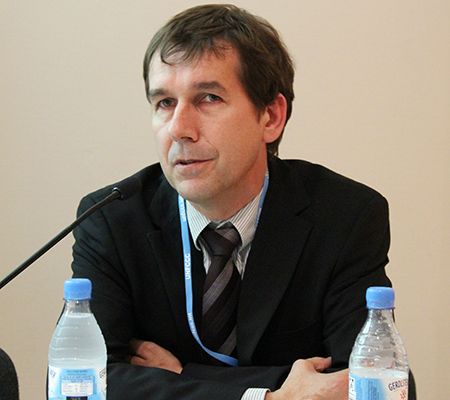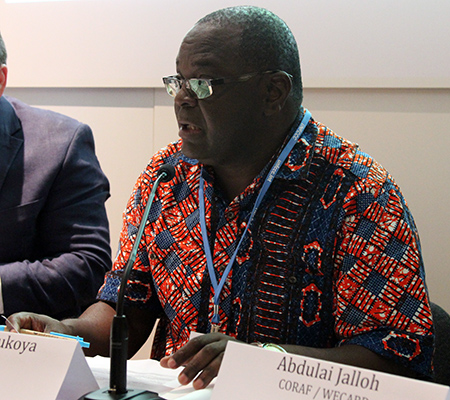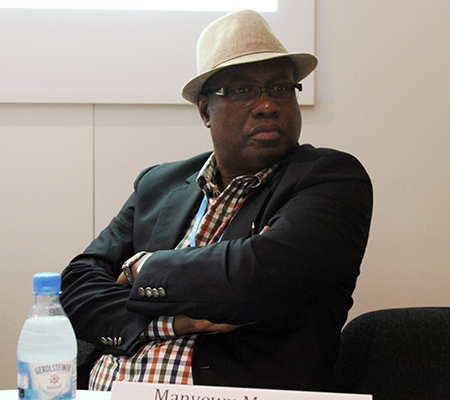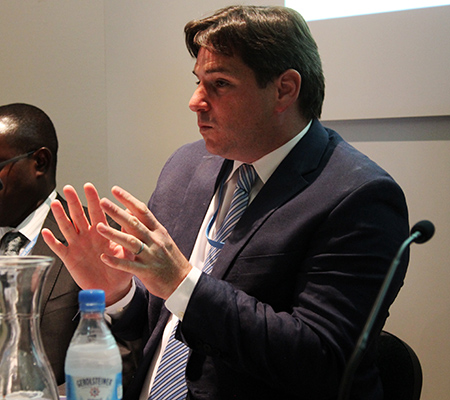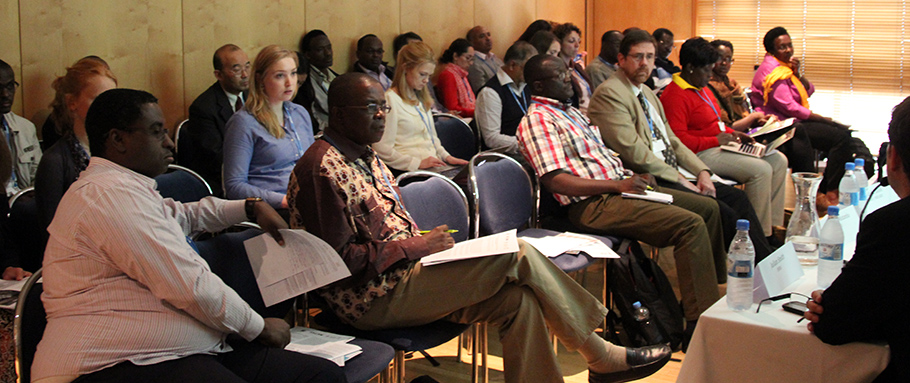Bonn Climate Change Conference - June 2015
1-11 June 2015 | Bonn, Germany
 |
 |
 |
Coverage of Selected Side Events at SBI 42, SBSTA 42 and ADP2-9
Highlights for Saturday, 6 June 2015
Subscribe to our ENBOTS Reports |
||
|
Receive our ENBOTS bulletins and reports by email |
||

| Follow @IISDRS | ||

Loading... |
||
|
Receive emailed updates with the news articles above plus related information and announcements from our CLIMATE-L community mailing list: |
||
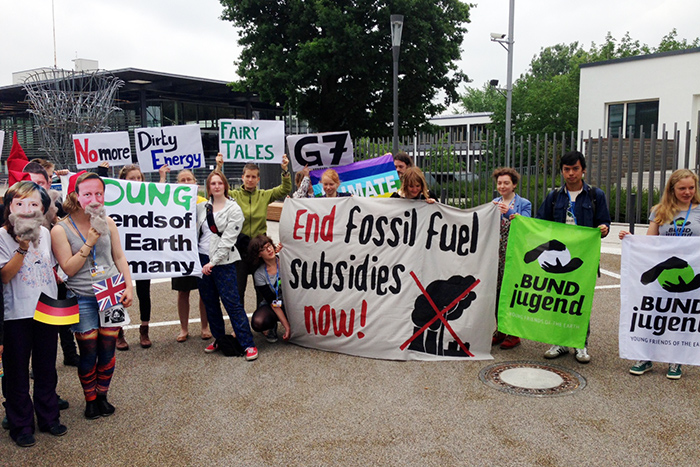
Protesters outside the World Conference Center Bonn |
||
|
The following side events were covered by ENBOTS on Saturday, 6 June 2015.
|
||
|
IISD Reporting Services, through its Earth Negotiations Bulletin on the Side (ENBOTS) Meeting Coverage, is providing daily digital coverage from selected side events at the Bonn Climate Change Conference - June 2015. | ||
Pre-2020 Climate Ambition: Bridging the Mitigation and Finance Gap
Organized by WWF and Climate Action Network (CAN) Europe
|
|
Moderator Tasneem Essop, WWF, introduced the session, which considered the challenges and potential solutions for addressing the pre-2020 ambition gap in mitigation and finance. Jaco du Toit, WWF, spoke on the emissions gap, stating that the carbon budget of 750GtC, which is the estimated maximum level of carbon to leave a 66% chance of remaining within the 1.5ºC limit, will be exhausted within 18 years at the current emissions rate. He stated that workstream two of the Ad Hoc Working Group on the Durban Platform for Enhanced Action (ADP) on increasing pre-2020 ambition should take priority over work on the post-2020 agreement, noting the potential of renewable energy to enable rapid emissions reductions. Maeve McLynn, CAN Europe, presented on the “100 billion dollar question” of how to increase climate finance to close the emissions gap. She noted the political implications of scaling up finance, stressing its importance in rebuilding trust between countries, and highlighted the need to direct attention to adaptation financing as well as mitigation. She discussed, inter alia: increasing support for low-carbon projects in developing and developed countries; innovative financing, such as emissions trading schemes and financial transaction taxes; and redirecting spending on fossil fuel subsidies to renewable energies. Lutz Weischer, Germanwatch, presented on scaling up action in developed countries, stating that research from the Carbon Tracker Analysis shows that pledges from G7 and the EU only amount to 5% of that needed by 2020 to stay within the 2ºC pathway. He discussed potential low-cost, high-benefit options for achieving emissions reductions, including: discontinuing the construction of fossil fuel-based infrastructure such as pipelines and coal plants; ending fossil fuel subsidies; and divesting from fossil fuels. Discussions followed, considering: technological innovation to reduce emissions in the transport sector; cooperation between ministries to streamline budgetary policies; regulatory tools to achieve “radical” emissions reductions within developed countries; competition between official development assistance and climate financing; achieving political will for scaling up ambition; financial risks of investing in fossil fuel-based infrastructure; sustainable development and avoiding “fossil fuel lock-in;” and the importance of political leadership and effective communication of climate change through the media. | ||
|
|
|
||||
Forest Finance Needs the Public Sector, Private Sector & Communities to Achieve its Goals for REDD+
Organized by Global Canopy Programme (GCP) and the Environmental Defense Fund (EDF)
|
|
|
|
Andrew Mitchell, Founder and Director, GCP, moderated the session, calling for the consideration of other sources of finance for REDD+ in order to generate funds to adequately address the drivers of deforestation. | ||
|
|
|
||||
The New Economics of Renewable Energy: Early Results from New Global RE Scenario Modeling
Organized by Greenpeace International
|
|
|
|
This side event, jointly organized by Greenpeace, the World Future Council (WFC), World Wind Energy Association (WWEA), and Climate Action Network (CAN) considered the path to achieving the total decarbonization of the energy sector. Discussing opportunities and challenges in achieving an energy mix solely of renewable energy (100% RE), Sven Teske, Greenpeace International, outlined seven steps to attain the goal, including: defining natural limits such as renewable energy availability and decarbonization needs; identifying drivers of energy demand; identifying implementation timelines; identifying required infrastructure; selecting required policies; and defining energy potentials by sectors. Presenting preliminary findings of his study, he noted that the path to energy-sector decarbonization could be 7-10 years before the timeline predicted by the International Energy Agency. Highlighting that over half of the global growth in CO2 was due to Chinese coal consumption, Li Shuo, Greenpeace East Asia/China said any global climate solution would need to address this issue. Noting that China’s coal consumption had dropped by 2.9% for the first time since 1998, Li wondered if that was the peak point in Chinese coal consumption. Li further noted the decoupling of economic growth from coal consumption and said the implications for emissions of such a change would be profound. Irene Garcia, World Future Council, highlighted Morocco’s three pillared national energy strategy: national regulations to eliminate fossil fuel subsidies; creation of national institutions to manage renewable energy programs; and focus on foreign direct investment in the clean energy sector. She also suggested policy recommendations, including: the need for a visioning exercise, and embedding renewable energy strategy into national economic development plans with a comprehensive, integrated framework. Highlighting the important role of wind power in countries like Denmark, Spain, Portugal and Uruguay, Stefan Gsänger, WWEA, said attractive aspects of wind energy including security of energy supply, environmental sustainability, affordability and low risk drive its demand. He identified finance as a bottleneck and suggested that the Green Climate Fund could set up a feed-in tariff (FiT) facility to afford credibility to FiT schemes in developing countries. Sixbert Mwanga, CAN Tanzania, identified opportunities presented by achieving 100% renewable energy in the energy mix, including: access to clean energy to transform livelihoods; quick and reliable access to affordable energy; local and national energy security; and reduced emissions due to avoided fossil fuel use. He underlined the challenges faced, including: competition from heavily subsidized fossil fuels, and lack of political will leading to a reluctance by the private sector to invest. During discussions, participants exchanged views on, among others: drivers of reduced coal consumption in China such as structural changes of the Chinese economy; best practices for fossil fuel subsidy reform; export of Chinese energy technologies, including coal and wind; and the problems of corruption. | ||
|
|
|
||||
Cities and Climate Change: From the New Climate Agreement to the New Urban Agenda (Habitat III)
Organized by the UN Human Settlements Programme (UN Habitat)
|
|
|
|
|
Session moderator Robert Kehew, UN Habitat, spoke on the coordination of the two global agendas related to cities, namely the climate change agreement in Paris in 2015, and discussions on a new urban agenda at Habitat III Quito in 2016. | ||
|
||||
Filling the Evidence Gap: Linking Agricultural and Climate Change Science and Policy in Africa
Organized by the government of Kenya, Southern African Confederation of Agricultural Unions (SACAU), the Consultative Group on International Agricultural Research (CGIAR), Research Program on Climate Change, Agriculture and Food Security (CCAFS), and the University of Copenhagen
|
|
|
|
|
Charles Mutai, Ministry of Environment, Water and Natural Resources, Kenya, delivered opening remarks, pointing to the importance of agriculture to socioeconomic activity in Africa and the resulting vulnerability to the agriculture-related impacts of climate change. He described policies to address climate change in Kenya, noting the need for enhanced coordination of sectoral policies and institutional arrangements between different ministries. Kevin Coffey, CCAFS, presented on expanding the contribution of early warning systems, noting the need to link these more effectively to decision-making processes to enable efficient responses. He highlighted recommendations, including: establishing objective rules for response measures based on parametric triggers; integrating early warning information into development activities; broadening dissemination of information to community levels; and incorporating feedback into early warning systems. Julian Smith, Food and Environment Research Agency, discussed the implications of climate change for the spread of pests in crops, livestock and aquatic ecosystems, observing that global distributions of crops will be transformed by climate change. Distinguishing between progressive trends and erratic shocks, he noted the particular difficulty in adapting to shocks, calling for further research on anticipating and preventing their effects on the spread of agricultural pests. He discussed the impact of extreme weather events on global trade routes, noting that such changes play a role in increasing the global spread of pests from infected to previously non-infected areas. Abdulai Jalloh, West Central African Council for Agricultural Research and Development, spoke on enhancing dialogue on adaptation between researchers and policymakers, presenting experience from the ‘AfricaInteract’ project. He noted an aim of the project to respond to challenges of uncertainty regarding different regional impacts of climate change by enabling Africa to build its own knowledge base to inform evidence-based policy making. He highlighted that a key finding of the project was evidence of local knowledge-based autonomous adaptation by crop farmers, pastoralists and fisherfolk. Among other recommendations, he suggested that adaptation measures should be tested for contribution to resilience across the entire food chain. James Kinyangi, CCAFS, launched the CCAFS Info Notes and UNFCCC Guidance to Negotiations Toolkit, a set of tools and working papers available for consultation on the CCAFS website. George Wamukoya, Common Market for Eastern and Southern Africa (COMESA), moderated discussions, before concluding the session by highlighting the importance of using scientific research and knowledge to inform policymaking frameworks and negotiating positions of African countries in order to lend credibility to policies and level the playing field between negotiators in the developing world and those in the developed world. | ||
|
|
||||
|
The Earth Negotiations Bulletin on the side (ENBOTS) © <enb@iisd.org> is a special publication of the International Institute for Sustainable Development (IISD). This issue has been written by Rishikesh Ram Bhandary, Tallash Kantai and Gillian Nelson, Ph.D. The Digital Editor is Mike Muzurakis. The Editor is Dan Birchall <dan@iisd.org>. The Director of IISD Reporting Services is Langston James “Kimo” Goree VI <kimo@iisd.org>. Specific funding for coverage of side events through ENBOTS has been provided by the Kingdom of Saudi Arabia. The opinions expressed in ENBOTS are those of the authors and do not necessarily reflect the views of IISD and funders. Excerpts from ENBOTS may be used in non-commercial publications only with appropriate academic citation. For permission to use this material in commercial publications, contact the Director of IISD Reporting Services at <kimo@iisd.org>. Electronic versions of issues of ENBOTS from the Bonn Climate Change Conference - June 2015 can be found on the Linkages website at http://enb.iisd.org/climate/sb42/enbots/. The ENBOTS Team at the Bonn Climate Change Conference - June 2015 can be contacted by e-mail at <tallash@iisd.org>. | ||
has been provided by the Kingdom of Saudi Arabia and the European Union


IISD Reporting Services is grateful to the many donors of the Earth Negotiations Bulletin (ENB) and recognizes the following as core contributors to the ENB: the European Union, the Finnish Ministry for Foreign Affairs, the German Federal Ministry for the Environment, Nature Conservation, Building and Nuclear Safety (BMUB), the International Development Research Centre (IDRC), the Japanese Ministry of Environment (through the Institute for Global Environmental Strategies - IGES), the New Zealand Ministry of Foreign Affairs and Trade, the Kingdom of Saudi Arabia, SWAN International, Government of Switzerland (the Swiss Federal Office for the Environment (FOEN), the Swiss Agency for Development Cooperation (SDC), and the United Nations Environment Programme (UNEP). Funding for translation of the Bulletin into French is provided by the Government of France, the Wallonia, Québec, and the International Organization of La Francophonie/Institute for Sustainable Development of La Francophonie (IOF/IFDD).




